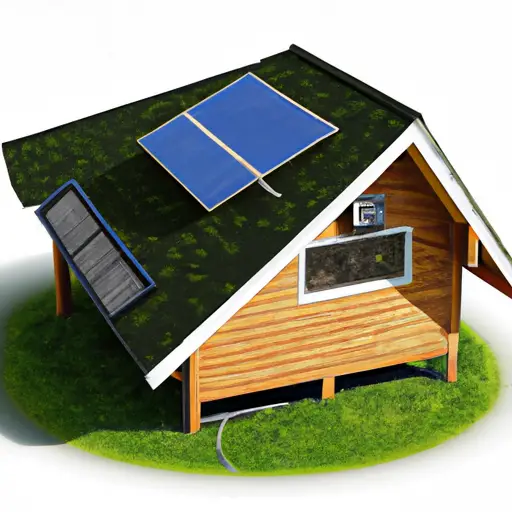Have you ever wondered what it would be like to live completely off the grid? To disconnect from the hustle and bustle of city life and rely solely on your own resources? Well, you’re not alone. Many people are starting to see the advantages of off-grid living and are choosing to take the plunge. But what exactly are these advantages and why is off-grid living better than being connected to the grid?
In this article, we will delve into the ins and outs of off-grid living and explore the numerous advantages it offers. From reducing your carbon footprint to gaining self-sufficiency, off-grid living provides a wealth of benefits that are often overlooked in our modern society. You will learn about the various technologies and strategies that can be implemented to create a sustainable off-grid lifestyle, and how this can lead to a more fulfilling and environmentally-friendly existence.
So, if you’ve ever dreamed of living off the grid, or if you’re simply curious about what it entails, this article is for you. Join us as we dive into the world of off-grid living and discover the advantages that await those who choose to disconnect from the traditional grid system. Whether you’re interested in self-sufficiency, environmental conservation, or simply seeking a more peaceful and sustainable way of life, off-grid living may just be the answer you’ve been searching for.

Advantages of Off-Grid Living
When it comes to choosing a lifestyle that emphasizes self-sufficiency and sustainability, off-grid living stands out as a compelling option. As the world grapples with environmental challenges and increasing dependence on fossil fuels, many individuals are seeking alternative ways to live that minimize their impact on the planet and enhance their independence. This article will explore the numerous advantages of off-grid living, from energy independence to increased resilience and preparedness.
Energy Independence
One of the key advantages of off-grid living is the ability to achieve energy independence. By generating your own electricity through renewable sources such as solar panels or wind turbines, you are no longer reliant on the electric grid. This means you have greater control over your energy consumption and are not at the mercy of power outages or rising utility costs. With energy independence, you can be certain that your lights will always be on and your appliances will always function, even during a blackout.
Cost Savings
Off-grid living presents an opportunity for significant cost savings. While the initial investment in renewable energy systems may seem daunting, the long-term financial benefits are undeniable. By generating your own electricity, you eliminate the need to pay monthly utility bills, which can add up to substantial savings over time. Additionally, off-grid living often encourages a more conscious and efficient use of resources, leading to reduced consumption and further cost savings.
Environmental Sustainability
Perhaps one of the most compelling reasons to embrace off-grid living is its positive impact on the environment. By relying on renewable sources of energy, off-grid individuals contribute significantly less to greenhouse gas emissions and air pollution. The use of fossil fuels, which are the main culprits behind climate change, is minimized or eliminated altogether. Choosing to live off-grid means making a conscious decision to tread lightly on the Earth and preserve it for future generations.
Freedom from Utility Companies
Living off-grid offers the unique advantage of freedom from utility companies. Rather than being tied to a specific provider and subjected to their rules and regulations, off-grid individuals have the liberty to make their own choices. They are not at the mercy of fluctuating energy prices or unexpected surcharges. Instead, they have the power to produce and manage their own energy, giving them greater control over their lives and reducing their dependence on external entities.
Greater Self-Sufficiency
One of the most empowering aspects of off-grid living is the development of greater self-sufficiency. When you produce your own energy, grow your own food, and manage your own waste, you become less reliant on external systems and resources. This level of self-sufficiency gives you a sense of accomplishment and security, knowing that you can meet your basic needs without relying on others. It fosters a sense of independence and self-reliance that is increasingly rare in our interconnected world.
Reduced Carbon Footprint
Living off-grid inherently results in a reduced carbon footprint. Traditional energy sources such as coal or natural gas are major contributors to greenhouse gas emissions and climate change. By utilizing renewable energy sources such as solar or wind power, off-grid individuals actively contribute to reducing their carbon emissions. This conscious lifestyle choice helps preserve the environment and promotes a cleaner, more sustainable future for all.
Minimal Dependence on Fossil Fuels
Off-grid living dramatically reduces your dependence on fossil fuels. These non-renewable resources are not only finite in supply but also have a detrimental impact on the environment. By embracing renewable energy options, off-grid individuals decrease their reliance on fossil fuels for electricity generation and heating. This shift not only benefits the planet but also helps to conserve these valuable resources for future generations.
Flexibility in Location
One of the significant advantages of off-grid living is the flexibility it affords in terms of location. Unlike on-grid living, you are not restricted to areas with access to the electric grid. Remote and rural locations that lack traditional infrastructure become viable options for off-grid living. This opens up a world of possibilities, allowing you to choose a location that aligns with your values and desires, whether it be surrounded by nature or on a mountainside.
Opportunity for a Simpler Lifestyle
Off-grid living often presents an opportunity for a simpler lifestyle. By reducing your reliance on modern conveniences and technology, you can focus on the essentials and prioritize what truly matters. Living off-grid encourages a less materialistic mindset and fosters an appreciation for the natural world. It allows you to disconnect from the constant noise and distractions of modern life and reconnect with yourself and your surroundings, leading to a more fulfilled and purposeful existence.
Increased Resilience and Preparedness
In an era of increasing uncertainty and natural disasters, off-grid living offers increased resilience and preparedness. By producing your own energy and resources, you are better equipped to handle unexpected events such as power outages, extreme weather conditions, or other emergencies. Off-grid individuals tend to develop skills in sustainable living, resource management, and self-sufficiency, making them more adaptable and resilient in the face of challenges.
In conclusion, off-grid living provides a multitude of advantages that make it an appealing choice for those seeking a more sustainable, self-sufficient, and independent lifestyle. From energy independence and cost savings to environmental sustainability and increased resilience, living off-grid offers numerous benefits. By embracing this lifestyle, you can significantly reduce your carbon footprint while enjoying the freedom to live in harmony with nature and prioritize what truly matters to you. Embrace off-grid living and unlock the advantages it has to offer.





